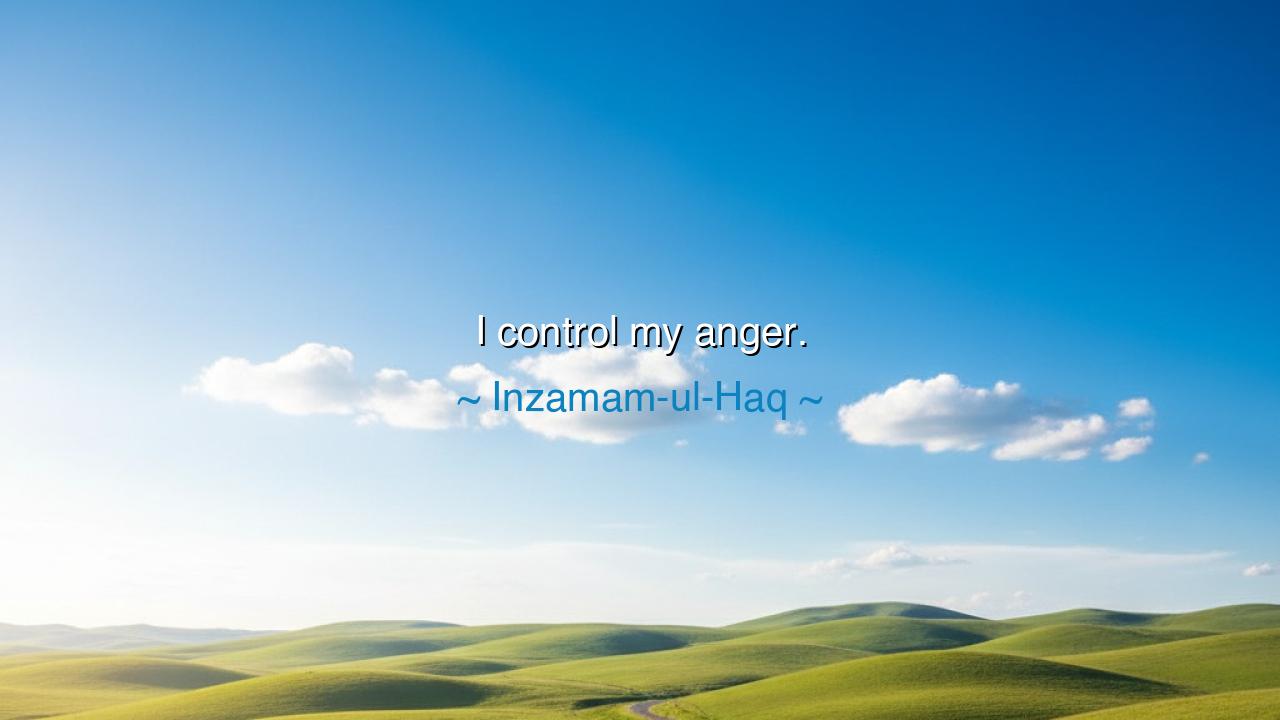
I control my anger.






The soft murmur of the café filled the air, blending with the steady rhythm of rain against the window. Jack sat across from Jeeny, his coffee cup cradled in his hands, staring out at the rain-soaked streets. Jeeny, sitting opposite him, seemed lost in thought, her fingers tracing the rim of her cup.
Host: After a brief silence, Jeeny spoke, her voice calm, but with a touch of curiosity.
Jeeny: “I came across a quote from Inzamam-ul-Haq today that made me reflect on emotional control. He said, ‘I control my anger.’ What do you think about that? Do you think controlling emotions like anger is an important skill?”
Jack: He looked up, considering her words. “I think Inzamam’s statement is a powerful reminder about the importance of emotional self-control. Anger is a natural human emotion, and it’s not something that can be eliminated. But the key is how we manage it. When we allow anger to take over, it can cloud our judgment, harm our relationships, and create unnecessary conflict. But when we control it, we can address the root of the problem without letting our emotions dictate our actions.”
Jeeny: “Exactly. Anger, in itself, isn’t bad—it’s a response to something that feels unjust or frustrating. But if we let it drive our decisions, we often end up doing or saying things that we regret. Learning to control anger isn’t about suppressing it; it’s about acknowledging it and then choosing how we respond. Self-awareness is a huge part of that process.”
Host: The rain outside had softened, leaving a quiet stillness in the café. Jack shifted slightly, his fingers still resting on his coffee cup as he continued.
Jack: “I think that’s the hardest part—recognizing when anger is starting to take over and then choosing to take a step back. It’s easy to react impulsively, especially in high-pressure situations. But the real strength comes from being able to pause, take a deep breath, and respond in a way that’s calm and thoughtful. When we control our anger, we have more control over the outcomes of our interactions and decisions.”
Jeeny: “Yes, and it also speaks to emotional maturity. The ability to control anger reflects an awareness of yourself and your reactions. It shows that you’re not ruled by your emotions, but that you can use them to guide you in a way that’s more constructive. Inzamam’s words remind us that strength isn’t just about physical control—it’s about mastering our inner selves, too.”
Host: The conversation seemed to deepen, as they both reflected on the importance of emotional control. Jack set his coffee cup down gently, his expression thoughtful.
Jack: “I think emotional control, especially when it comes to anger, is something we all strive for, whether we realize it or not. In high-stress situations, the ability to stay composed can make all the difference. It’s not about being emotionless—it’s about using our emotions in a way that serves us and others in the best way possible.”
Jeeny: Her smile was small but filled with understanding. “Exactly. And that’s why Inzamam’s quote is so powerful. It’s not about denying your emotions—it’s about taking responsibility for them, understanding them, and choosing the best way to express them. When we can control our anger, we create the space for growth, both personally and in our relationships.”
Host: The rain had stopped, leaving a calm quiet in its wake. Inside, Jack and Jeeny sat in the realization that controlling our anger is not about suppression, but about mastery—choosing how to respond rather than react. Inzamam-ul-Haq’s words remind us that emotional control is a sign of strength, maturity, and awareness. When we learn to manage our emotions, we gain control over our actions and, ultimately, the way we shape our interactions and our lives.






AAdministratorAdministrator
Welcome, honored guests. Please leave a comment, we will respond soon